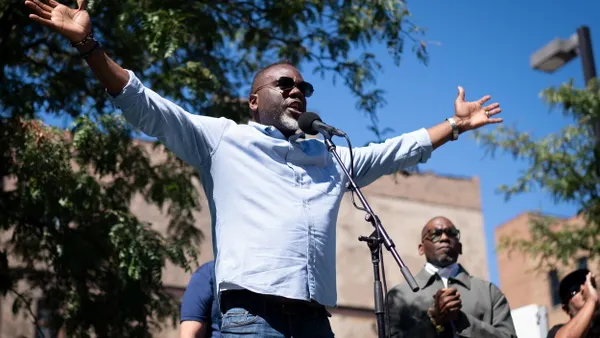UPDATED, Dec. 22, 2020: Congress passed a $900 billion stimulus package for coronavirus (COVID-19) relief on Monday, in addition to a $1.4 trillion omnibus bill to fund the government through September 2021. The final stimulus bill did not include local or state relief.
President Trump has indicated he will sign the package.
City leaders reiterated their calls for further funding for state and local governments. In a statement released Monday evening, Seattle Mayor Jenny Durkan accused Republicans in Congress of holding the country "hostage."
“While Congress has acted on common sense unemployment measures and continuing small business loans, it has failed to address so many aspects of this crisis and scale to the desperate needs of our residents, small businesses, cities, and states who have been on the frontlines,” Durkan continued.
The legislation did include a $14 billion provision for the transit sector, which industry leaders say will help keep public transit going for now, but further assistance must come soon.
"This $14 billion of desperately needed emergency transit funding is vital to the industry’s survival and is a much-needed immediate step in bolstering an industry ravaged by the coronavirus pandemic,” American Public Transportation Association (APTA) President and CEO Paul Skoutelas said in a statement late Monday.
Dive Brief:
- Congress is set to approve another round of stimulus on Monday to mitigate the economic impact of the coronavirus (COVID-19) pandemic, as city leaders criticize a lack of state and local aid in the final package.
- The $900 billion legislation is set for final passage in the U.S. House of Representatives and U.S. Senate today after intense negotiations amid the looming threat of a government shutdown. State and local government funding had been part of negotiations, but it was dropped from the final legislation as lawmakers were unable to reach an agreement, bringing a stinging rebuke from various city-level organizations.
- In a statement released Friday amid ongoing negotiations, U.S. Conference of Mayors (USCM) President and Louisville, KY Mayor Greg Fischer said Congress left mayors "alarmed, perplexed and livid" as they struggle to balance their "pandemic-ravaged budgets." National League of Cities (NLC) Executive Director and CEO Clarence Anthony said in a statement late Sunday it is "beyond disappointing" that no aid is forthcoming.
Dive Insight:
As federal aid negotiations further divide Congressional leaders, USCM has been among those calling for the critical support of local governments.
In July, USCM leadership sent a letter to Congressional leaders calling for $250 billion in federal funding to support flexible emergency assistance in all cities, having made a joint call alongside NLC for the same figure in April. That request accompanied a survey that found 88% of local government respondents anticipate "painful reductions in revenue this year" due to the pandemic.
Fischer has warned of further painful job and service cuts as cities try to fill the gaping holes in their budgets. Already, USCM estimated that 1.3 million state and local government workers have lost their jobs, while city leaders have expressed concerns that services including education, parks and transportation will have to be cut to address fiscal shortfalls. State governments have raised similar concerns about cuts to services given the budgetary headwinds they face.
"At a time of national crisis, when the federal government is relying on cities to help lead the response and recovery efforts, this bill fails to deliver the resources mayors need to effectively protect the health and well-being of residents and the jobs of our first responders," Fischer said in his Friday statement.
With COVID-19 vaccines set for public distribution in the coming months, NLC's Anthony said help for local governments would be key in preparing for a massive vaccination campaign, though some provisions like eviction moratoriums and the reupping of the Paycheck Protection Program (PPP) can help in the short-term.
"Although this week began with lawmakers predicting a 'Christmas miracle,' it is now clear that all they were able to deliver was a lump of coal in the stocking of every mayor across the country," Anthony said.
The bill is expected to include $14 billion in funding for transit agencies, down from the $25 billion agencies received in March under the $2 trillion Coronavirus Aid, Relief, and Economic Security (CARES) Act. The relief also falls short of the $32 billion that the American Public Transportation Association (APTA) and others requested for transit recovery.
.@SenSchumer notes McConnell had "zero" for transportation -- the final bill has $45 billion for transportation ($15 billion for airlines, $14 billion transit, $1 billion Amtrak, $10 billion state highways)
— davidshepardson (@davidshepardson) December 21, 2020
Democratic leaders in Congress said in a statement this legislation is an “important first step,” but more must be forthcoming after President-elect Biden is inaugurated in January.
"State and local governments will certainly need additional funding to prevent the senseless layoffs of heroic essential workers and critical service cuts," Senate Minority Leader Chuck Schumer, D-NY and House Speaker Nancy Pelosi, D-CA, said in a joint statement.












